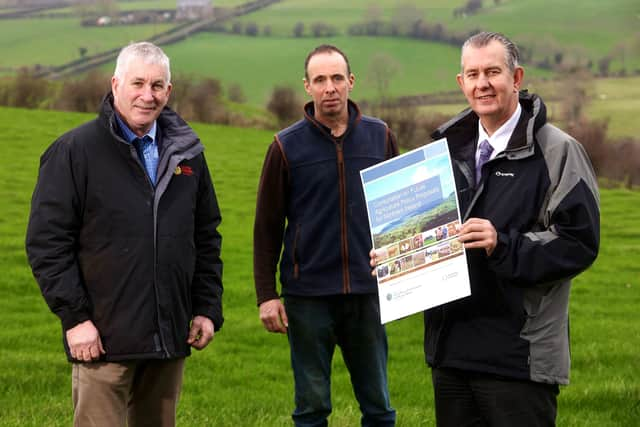Consultation on Future Agricultural Policy Proposals for Northern Ireland launched


The consultation seeks the views of stakeholders on the policy proposals being developed to achieve the four key outcomes of the Future Agricultural Policy Framework Portfolio, published by the Minister on 24 August 2021.
There are eight main product workstreams which constitute the primary components of the programme in the foreseeable future.
Advertisement
Advertisement
These include a resilience measure, a crisis framework, a headage sustainability package, a farming for nature package, farming for carbon measures, an investment measure, knowledge measures, a generational renewal measure and supply chain measures.
It is proposed that there will be a relatively simple area based resilience payment to provide a basic safety net, whilst also delivering foundation environmental outcomes.
The proposal is that progressive capping of resilience payments will apply above £60,000, with a percentage reduction within each band, increasing gradually over a period of time.
There is a proposed increase in the minimum claim size to 10ha, from the current 3ha.
Advertisement
Advertisement
A headage sustainability package, with a measure for suckler cows and a beef transformation measure, will be funded by the immediate redirection of up to 17 per cent of the overall farm support budget away from an area-based distribution.
There is a proposed reduction to the age of first calving - to reduce the age of first calving heifers towards the ideal of 24-26 months, and to reduce the calving interval towards the ideal of 365 days.
Under the beef transformation measures, claimants would have to take measured steps to reduce the age of slaughter for clean beef animals to 24 months. A minimum slaughter age of 12 months, to be eligible for payment, is proposed.
However, this may be reviewed if, for example, there is evidence that cattle (in particular young bulls) are finished within a shorter timeframe, in which case the minimum slaughter age could perhaps be overridden if a minimum slaughter weight is also achieved by these young animals.
Advertisement
Advertisement
Mr Poots commented: “In August this year, I launched the Future Agricultural Policy Framework Portfolio and at that time I indicated that a public consultation on the more detailed policy proposals being developed would follow.
“I am now pleased to launch this consultation today on the Future Agricultural Policy Proposals for Northern Ireland.
“This is the first time in almost 50 years that we have a unique opportunity to redefine our agricultural policy and target support to meet our local priorities and needs much more effectively.
“Achieving this vision will take a collaborative effort with industry and stakeholders in the co-development and design of new measures and interventions, using evidence to inform policy decisions, encouraging uptake of innovation, science and technology, encouraging knowledge and education exchange and ensuring these policies are supported by an appropriate level of regulation.
Advertisement
Advertisement
“My ultimate aim is to ensure that Northern Ireland takes full advantage of the opportunity to develop a sustainable agricultural industry in which all farmers are supported on an equitable basis to make best use of the assets at their disposal, and to invest in all forms of capital.”
The Minister continued: “As we build out this future portfolio, I want to ensure that farmers are supported and equipped with the right tools to continue producing high quality, nutritious food whilst importantly, also reducing their environmental impact.
“Going forward I want to devise support schemes that provide opportunities for all of Northern Ireland’s farmers. Schemes and support are needed to help farmers develop their businesses, no matter where they farm, to become more efficient and to maximise the sustainable returns they can achieve from the assets at their disposal.
“With appropriately designed policy interventions and innovation, all of this can be achieved without compromising the economic viability of the sector.
Advertisement
Advertisement
“If we get it right, the benefits to our rural economy can be substantial.
“I would encourage all stakeholders with an interest in food production and land use to respond so that together we can take full advantage of this unique opportunity to develop a future sustainable agricultural industry.
“I look forward to engaging with all those in the farming industry as we move forward with my vision for the future.”
The consultation on Future Agricultural Policy Proposals for Northern Ireland’ is now available to view on the DAERA website - https://www.daera-ni.gov.uk/consultations/consultation-future-agricultural-policy-proposals-northern-ireland
Responses are invited by 15 February 2022 via the nidirect consultation hub Citizen Space at: https://consultations2.nidirect.gov.uk/daera/daera-app